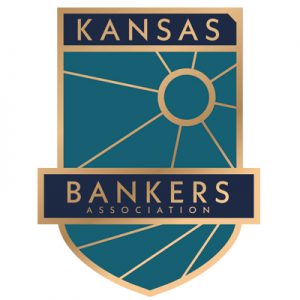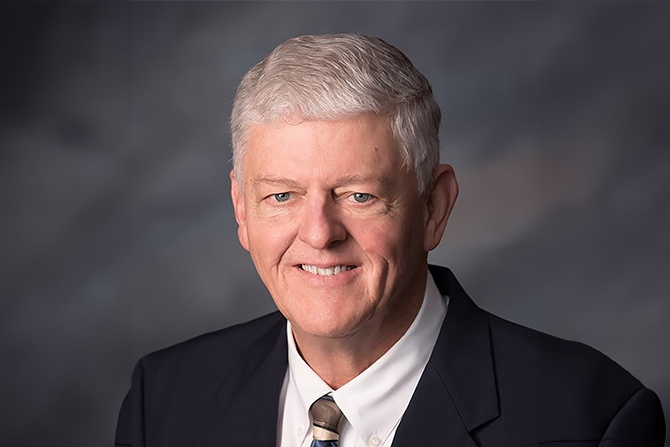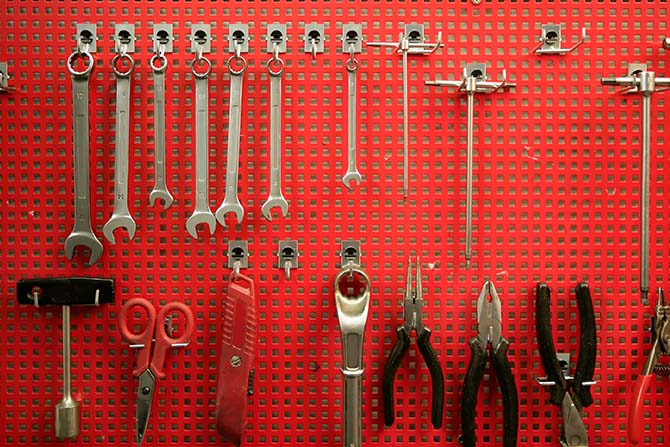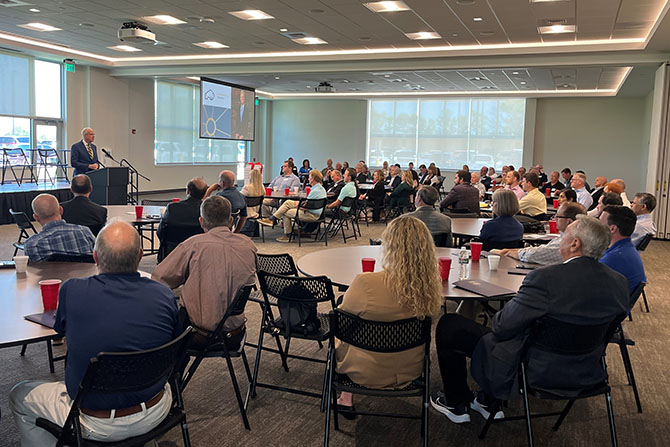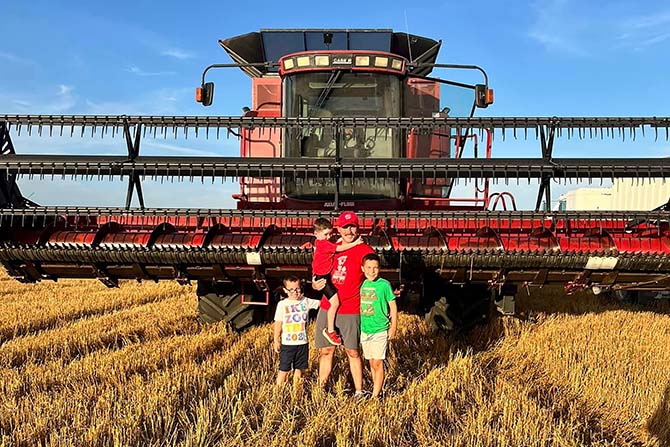D. Gene Dikeman II is the President and CEO of Bank of the Plains, which has nine locations in Kansas. Gene is also the 2024-2025 KBA Chairman. His life is nothing short of fascinating and has prepared him well to not only lead the bank but also take the helm of the KBA to help pilot the association through the upcoming year.
KBA had the opportunity to spend some time with Gene to talk about his life, successes and plans as the KBA Chairman. We hope you enjoy getting to know him as much as we did. The following are excerpts from our conversation.
Tell us about growing up in rural Kansas.
I was born and raised in Syracuse, Kansas. My grandparents were born in Pratt County, Kansas, in the late 1800s. In the early 1900s, they moved just north of Syracuse and that was the start of the family farm.
Their house was very small, probably smaller than my office. It was in the middle of nowhere and being comfortable with a life where you survived by being self-sufficient was a must. They started the farm from scratch, raising sheep, hogs and cattle, planting trees for shade and raising crops. There was no electricity. In fact, I recall as a young boy, standing next to their Caterpillar generator which was the only source of power for 30 years.
When it came time to get a telephone, the phone company wouldn’t invest the money into installing telephone lines as the farm was so remote. My grandparents went to Utah, picked up telephone poles, wire and insulators from the Army surplus and installed phone lines.
As a young boy, I helped with the hogs, cattle, chickens and whatever else needed to be done. When it came to keeping the farm equipment running, it was common to fly to equipment dealers with the family airplane and get the parts. I flew with my father and grandfather many times to pick up the needed parts. The day I turned 14, I made my first solo flight at the Syracuse airport.
Growing up in this environment set the stage for learning about taking responsibility for your family, community and others less fortunate. That is one of the reasons why community banking is such an appealing and rewarding career.
Did you always plan on going into banking?
A career in banking just happened. After I graduated from K-State with a business law degree, I went home and started working on the family farm. I had just married, and the times were tough. One day, Farm Credit called me and offered me a job in Garden City. They already knew me and that I had a lifetime of dry land agricultural experience.
It was a great experience. The manager did a wonderful job of getting our field department out and introducing us to all kinds of agribusinesses, feedlot owners and large operations. Sprinkler irrigation was coming into play at that time, and I quickly gained a lot of experience. About a year and a half later, I was promoted to be a lender.
I developed my own portfolio and was doing well for myself. Then, I received a phone call from a Production Credit Association (PCA) in southeast Nebraska. They asked if I would want to come up there and be a credit director. I was there for three years, then back to Kansas as PCA president. That was during the ag financial crisis of the 80s. There were Farm Credit Association mergers and layoffs. Farm Credit needed a cash injection from the U.S. Treasury and as part of the action nearly all of the capital of the Farm Credit system was consolidated.
That was hard to deal with because our PCA had worked hard to get financially where it was, then overnight, 80% of our capital was gone.
A flying friend — Reed Peters, First State Bank CEO — called and said he heard the news. We agreed a change in career was a good idea, and he was right. My banking career was started.
Have you had any mentors throughout your career?
My grandfather, Fred Dikeman, and father, Darrel Dikeman, were my mentors and life coaches. My grandfather was always working on equipment, metal lathes, old Lincoln cars and airplanes. The grandkids would huddle around, and he was always more than eager to share a wrench. The advice he shared with me that I never forgot was when mutual funds were in their infancy, and I shared my business college thoughts with him on the merits of the investment. He said, “Gene, always remember that return of your investment is more important than return on it.” My father already had experienced the benefit of my grandfather’s thoughts and values but added this. Whether you are behind the wheel of a truck or on the stick in an airplane, you are responsible for the outcome, no one else. “Be responsible and you will earn respect and trust,” he would say.
What’s the best day for you as a community banker?
Any day I get to help people is a great day, bank customers or not! I look forward to talking with the staff about what’s going on in the community and outlining what we’re going to do to help. Once the bank opens, I enjoy greeting customers, introducing myself and talking to them. It’s fun when you see a husband and wife come to discuss what we’ve already been talking about: a plan to grow their business. We know they’ve survived another year and made a little money. Watching the interaction where they’re both on the same page and they know their plans for the next two or three years — because they’ve not only talked about it, but we’ve talked about it with them — is fulfilling.
I am blessed to have an outstanding staff to work with. We don’t micromanage, instead, our culture is to mentor and coach. Building self-confidence is fun to watch. Three of our values they hear me talk about are: You can’t manage what you don’t measure, trust but verify and have faith in all you do. Beyond that, I am a Ronald Reagan fan. I do my best to follow his advice: “Surround yourself with the best people you can find, delegate authority and don’t interfere as long as the policy you’ve decided upon is being carried out.”
What does the future of community banking look like?
The future of community banking is bright. Community banking is a relationship and partnership that holds a special place in our communities’ ecosystems. Community banks support many critical parts of these communities: food stores, gas stations, pharmacies, insurance, producers of goods and services, housing, healthcare and so much more. Our employees are invested in our communities with time and bank resources. We call it skin in the game effort.
What are your thoughts on being KBA chairman and do you have any goals?
I agreed to be the chair of the KBA in large part because the association is so well-managed, with talented staff that are committed to helping the banks in the communities and the banking needs of everyone we serve.
I hope to build upon the excellent job that is already being done. The current environment we are in, with bank and business associations suing the regulators and the lack of communication, is unsettling. My goal would be that we get back to the point where we all sit down, talk and come up with good legislation and solid regulations that make sense. Community bankers know that our job is to safeguard the banking future. It’s going to take all of us to understand and communicate with the people who are making change.
What we accomplish in this arena today is going to help our grandchildren and even great-grandchildren — because we are able to stand up and keep something alive today, they’ll be able to enjoy it tomorrow. That is so important to me.
What can KBA members do to help you reach those goals?
I’d like to have each bank designate somebody as an advocate for legislative improvement. The designated employee would be the person that KBA could communicate with on time-sensitive legislative issues that need to be addressed. This would help support the hard-working CEOs who have some of the most challenging jobs in the history of banking.
We, as bankers, have to be committed to our values and roots in the communities we serve. Now more than ever, we have to fight to keep those values alive and put in the extra effort to preserve our way of life.
Tell us a little bit about your family.
I would first like to thank my wife, Mary, for all her support in my career and her understanding that being an effective CEO in today’s environment is not simple. It also helps that she was a former community bank trust officer. With 13 grandchildren, we have a lot to be thankful for in the journey we have been blessed with.



